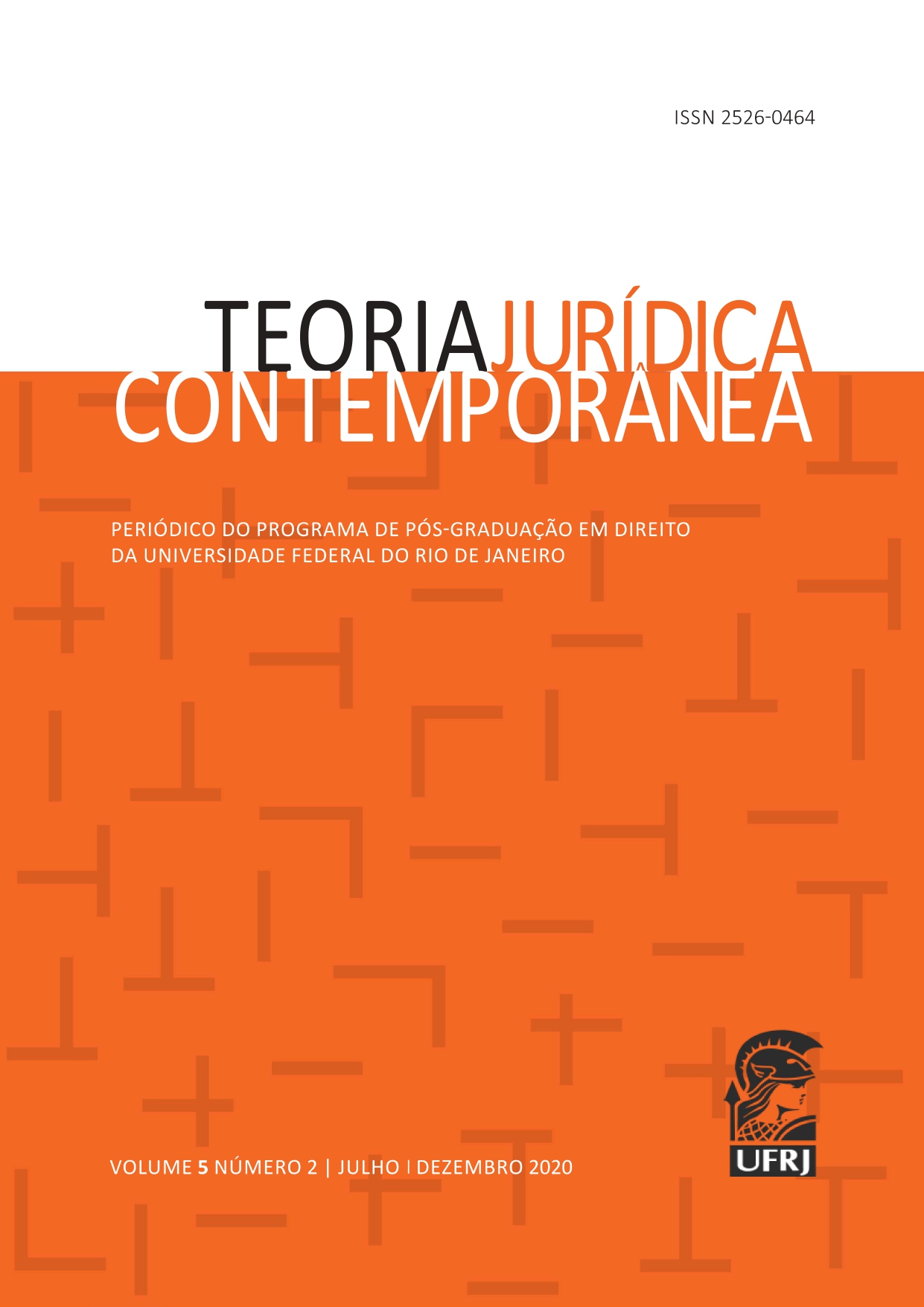The temporal milestone thesis in the federal supreme court decisions and the possessory controversy regarding the indigenous territorial rights
DOI:
https://doi.org/10.21875/tjc.v5i2.25496Keywords:
Temporal milestone, demarcation, territorial rightAbstract
ABSTRACT:
This article aims to analyze the application of the temporal milestone thesis, created by the Federal Supreme Court (STF), regarding the demarcations of indigenous lands in Brazil. The discussion analyze the Raposa Serra do Sol case, as well as three decisions issued by the Second Panel of the STF, in which it was applied that thesis as precedent to define the demarcation of indigenous lands. In the end, there is a discussion about the application of this new juridical category and the possessory controversy in face of indigenous territorial rights. The comparative, monographic and bibliographic methods were used based on three specific cases.
Downloads
References
BRASIL. Constituição (1988). Constituição da república federativa do Brasil. Brasília, DF, Senado Federal, 1988.
BRASIL. Supremo Tribunal Federal. Acórdão na Petição 3.388-4 Roraima. Relator: Carlos Ayres Brito. Publicado no DJ de 17 de mar. de 2009.
BRASIL. Supremo Tribunal Federal. Embargos de declaração na petição n.3388/RR. Relator: Min. Roberto Barroso. Publicado no DJ de 23 de out. de 2013.
BRASIL. Supremo Tribunal Federal. Recurso Ordinário em Mandado de Segurança n.29.087/DF. 2ª Turma. Relator: Min. Gilmar Mendes. Publicado no DJ de 14 de out. de 2014.
BRASIL. Supremo Tribunal Federal. Recurso Ordinário em Mandado de Segurança n.29.542/MA. 2ª Turma. Relator: Min.Cármen Lúcia. Publicado no DJ de 09 de out. de 2014.
BRASIL. Supremo Tribunal Federal. Recurso Ag Reg no Recurso Extraordinário com Agravo 803.462-MS. 2ª Turma. Relator: Min. Teori Zavascki. Publicado no DJ de 18 de dez. de 2014
CAVALCANTE, Thiago Leandro Vieira. "Terra indígena": aspectos históricos da construção e aplicação de um conceito jurídico. História[online].V. 35, e. 75, p. 1-22, jul.,2016.
DUPRAT, Deborah. O papel do judiciário na demarcação de terras indígenas. In: Povos Indígenas no Brasil,2001/2005, p. 172-175. Beto Ricardo e Fany Ricardo, orgs. São Paulo:Instituto Socioambiental, 2006.
DUPRAT, Deborah. O marco temporal de 5 de outubro de 1988 – TI Limão Verde. Disponível em: http://www.mpf.mp.br/atuacao-tematica/ccr6/documentos-e-publicacoes/artigos/docs_artigos/marco-temporal-1.pdf. Acesso em 28 de setembro de 2018.
PEGORARI, Bruno. A tese do “marco temporal da ocupação” como interpretação restritiva do direito à terra dos povos indígenas no Brasil: um olhar sob a perspectiva da Corte Interamericana de Direitos Humanos. In. ARACÊ- Direitos Humanos em Revista. São Paulo, v. 4, n. 5, p. 242-262, fev. 2017. Disponível em: https://arace.emnuvens.com.br/arace/issue/view/5/showToc. Acesso em: 20 de setembro de 2018.
SANTANA, Carolina Ribeiro. Direitos territoriais indígenas: o Poder Judiciário contra a Constituição.In. ENADIR 4, 2015, São Paulo, Grupo de Trabalho 15, São Paulo, 2015, p. 1-15. Processo, construção da verdade jurídica e decisão judicial. Disponível em: http://enadir2015.sinteseeventos.com.br/simposio/view?ID_SIMPOSIO=18. Acesso em 24 de setembro de 2018.
SILVA, Liana Amin Lima da FILHO, Carlos Frederico Marés de. Marco Temporal como retrocesso dos direitos territoriais originários indígenas e quilombolas. In: Os direitos territoriais quilombolas além do marco temporal. Goiânia, PUC Goiás, p. 55-83. 2016. Disponível em: https://docplayer.com.br/81774369-Os-direitos-territoriais-quilombolas-alem-do-marco-temporal.html. Acesso em 24 de setembro de 2018.
Downloads
Published
Issue
Section
License
The authors who publish in this journal agree with the following terms:
1. The authors maintain the copyright and grant the journal the right of first publication, with the work simultaneously licensed under the Creative Commons Attribution License that allows the sharing of the work with recognition of authorship and initial publication in this journal.
2. Authors are allowed to assume additional contracts separately, for non-exclusive distribution of the version of the work published in this journal (e.g., publishing in an institutional repository or as a book chapter), with acknowledgment of authorship and initial publication in this journal.
3. Authors are allowed and encouraged to publish and distribute their work online (e.g., in institutional repositories or as a personal page) at any point before or during the editorial process, as this may generate productive changes, as well as increase the impact and citation of the published work (See The Effect of Open Access).

This work is licensed under a Creative Commons Attribution-ShareAlike 3.0 Brazil License.

